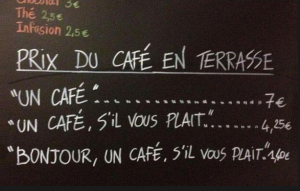The French? Really?
On the surface, French customer service seems like an oxymoronic concept. Every culture has its code for unlocking customer service. If you use the code, you get better treatment. In the U.S. as you walk the aisles of a grocery store looking for Grey Poupon, what do you say to the clerk in the aisle if you need help?
You say “Pardon me” (if you’re in the commercial), or “Excuse me.”
“Excuse me” is the polite and accepted way of beginning your request for help. It says, “I know you are in the middle of something else, but I’m confused and could you give me a hand.”
Good customer service is when the store employee sees you scanning the shelves and doubling back, or notices your look of confusion, and asks, at the moment when you need help, “Can I help you?”
(this, by the way, rarely happens in Paris)
“Excuse me” is our American code for I am about to ask for help. You could just say “Where’s the flour?” But even in New York City this is ever so mildly, rude. On the other hand, “Excuse me, where is the flour?” is ok. It’s not rude.
“Excusez-moi.” I say to the man stocking shelves at the Monoprix grocery store. He turns, looks me in the eye with raised eyebrows and says, “Bonjour.” He says it with a rising inflection. It’s a question. And what it really says is “I’m admonishing you. You forget to say hello.” It’s the New York equivalent of, “Can you believe this guy? Comes in and start asking me to help, before he even says hello. Hellooo. What do I work for you?” That’s kind of what the Parisian clerk says with “Bonjour.”
More than half the time, even after fourteen years, in the frustration of trying to find the right conditioner for my pre-teen daughter, my American pattern kicks in. I forget “Bonjour.” I say “Excuse me,” and then curse myself as I have to retreat, issue a make-up “Bonjour” to try to get back on track.
Because in France. “Hello” is the code, and “Excuse me” isn’t. Indeed the admonishing “Bonjour” is slightly rude, but that doesn’t matter. I was rude first. I didn’t say “Hello.” I didn’t use the code.
“Bonjour” says. I recognize you as a human being first, not a cog in the wheel of my shopping machine. “Bonjour” is a conversation starter. It’s an introduction. It’s nice.
Recently, in America, I slipped the other way. I led with ‘Hello’ rather than “Excuse me.”
What do you think happened?
The clerk turned to me, smiled, and said “Hello”.

“Hello,” it turns out works in America too. “Hello” says hi. It’s required in Paris, and downright friendly in America. In the US, it has the added benefit of being scarce and unexpected. (I have been advised that in Minnesota, “Hello” is as common a start as “Excuse me.” …..Nice people.)
Perhaps, the French (and the Duluthians)are on to something here. Using the American code “Excusez-moi” in Paris doesn’t work. But employing the French code “Hello” in the US was an improvement.
In the examples above, I am the client in a confusing retail environment. I’m just trying to get some help.
Let’s translate that to the waiting area at the offices of a potential client. Suppose I am the salesperson making my first visit. Like the Parisian grocery store, I am still the one in a new environment. I don’t know the ropes. I’m trying to gather information and get oriented. The only difference is, this time, ultimately, I’m trying to sell something rather than buy. Which isn’t that different. I am still trying to get information in order to make an exchange.
I am armed with my French technology, “Bonjour.” What happens when I deploy it.
I find that “Hello” works.
Say “Hello,” to people passing in the lobby, to the receptionist, to the guy repairing the card scanner at the entry, to the woman getting a drink of water at the cooler. Everyone in that open space reception area probably knows more about the people and the organization than I do. “Hello” throws my hat in the ring to have a conversation. “Hello” is a gentle invitation to an introduction. It recognizes people as human beings. It’s nice. It’s a conversation starter. Of course, the conversation induced may not be useful. It may not have any use whatsoever. But it can’t be any less useful than the conversation I never have.
As many a Parisian grocery store clerk has reminded me, it all starts with “Hello.”